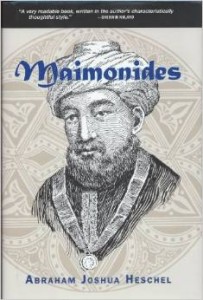 Make no mistake about it, Rambam was bad for Karaism. And despite the whisperings of some Karaites, Rambam was not a closet Karaite. He just wasn’t.
Make no mistake about it, Rambam was bad for Karaism. And despite the whisperings of some Karaites, Rambam was not a closet Karaite. He just wasn’t.
But the Rabbinic community’s growing return to Rambam-based principles is undeniably good for Karaites and Karaism. Today we look at Rambam’s impact on Karaism both historically and today.
First, the bad: Rabbi Moshe ben Maimon (aka, the “Rambam” or “Maimonides”) clearly drove an unbridgeable (so far) wedge between Karaism and Rabbanism. While the Rambam did not prohibit marriages between Karaites and Rabbanites, he disapproved of Karaite divorce documents. It appears that the basis of his disapproval was that Karaite divorce documents were written in Hebrew – not Aramaic. Of course, it makes sense that a Karaite sefer kritut (or “get” as divorce documents are often referred to) would be written in Hebrew, because Hebrew is (for the most part) the language of the Torah and knowledge of Hebrew is one of the 10 Karaite principles of faith.
Now, the good: Rambamism – or the adherence to the values of the Rambam – represents a return to Rationalist Judaism. Rationalist Judaism is a form of Judaism that focuses on “reason” and “logic” – as opposed to superstition (among other items).
It is not a coincidence that the Golden Age of Karaite Judaism corresponded to a heightened emphasis on rational approaches within the general Jewish community. In fact, Tomer Mangoubi, author of Mikdash Me’at recently opened my eyes to the relationship between “rationalism” and “peshat”, the plain meaning of the text. According to Tomer, peshatism (for lack of a better word on my part) is a subset of rationalism.
Interestingly, Jacob al-Kirkisani – an 10th Century Karaite Sage who predated Rambam – believed that all Jews (and Karaites, in particular) are obligated to “adopt whatever beliefs emerge from investigation” and he was disheartened when Karaites rejected “rationalism in favor of received opinion.” [1]
Finally, the shocking: It is too early to tell, but my impression of the nascent Rambam revival is that it will lead to a renewed emphasis on the historical methods of Jewish prayer – namely, prostration. The Rambam’s Mishneh Torah explains how Rabbanites should prostrate while praying. Karaites and Rabbanites prostrate slightly differently; but from where I come from any prostration by the Jewish people is a good thing. I’m also hopeful that the renewed emphasis on prostration in the Rabbinic movement might ignite a passion for prostration among young American Karaites (native born and former Rabbanites).
To be clear, there are marked differences between Rambamism and Karaism. The Rambam follows the Rabbnic calendar – which is wrong from a peshat (i.e., plain meaning) perspective on Shavuot; he also permits the eating of alyah (i.e., the fat used to make shawarma), which is forbidden by a peshat reading of the text.
But as someone who wants more Jewish diversity – and has a preference for rational Judaism – I welcome the growing Rambamist movement to the scene. Yashar Koach, Kol Hakavod, and Hazak u’Varukh.
* * *
[1] Rustow, Dr. Marina: Heresy and the Politics of Community: The Jews of the Fatamid Caliphate, p. 142


Not sure if there is a return to rationalism in the Orthodox world – even the Modern orthodox are largely mystic/hassidic oriented.
What might be more correct would be to call it Bounded rationalism.
The congratulation is “Yishar Ko’aḥ” (יישר כח).
Is the lack of passion for prostration among the younger American Qaraites preventing them from praying in the Daly City synagogue and in private?
As always, an enlightening read. Thank you!
Personally, my biggest objection to the a Rabbinical calendar is its use of Babylonian deity names for the months and the resulting alignment of certain Rabbinical practices with Babylonian ones.
What I find disturbing about the Rambam overall is his love of blending Aristotelian philosophy into his Torah learning. Aristotle was Alexander the Greats teacher and I dont claim to be an expert on Rambam or Aristotle, but I do know that the Torah and Neviim Ketuvim are filled with as much philosophy and wisdom as any Non Israelite philosophy.
Dont need the Mityavene treif. We have enough tipshut among the people.
Read Yehuah Halevis and Hasadai Crescas for a more engaging analysis of Aristotle and why he is nothing but fluff in true Israelite Philosophy.
Lehit vekol tov
I can see the appeal for some of the Rabbanites who are wanting a more simplistic and categorized presentation of Judaism to turn to the Rambam. However, I don’t feel that Aristotileanism is a good match for Judaism and doesn’t present a “rational” avenue for Judaism in the least. According to the Rambam, any Jew who disagrees with the “majority,” even if their opinion is supported by the prophets should be executed as the dissenter from the majority violated the Talmudic mandate to not divert from the teachings of Chazal- neither to the left or the right. The Rambam has numerous problems in his exegesis in MT and G4P which lead to erroneous halachic ideals to outright immorality and violence.
Yes; this is a good point. The Karaite view is that majority does *not* rule.
From my perspective as a Gentile, Rambam was an unmitigated disaster for Rabbinic Judaism, in trying to circumcise it of superstition he castrated it from its roots in Tenach, by deeply embracing neoPlatonism. This is evident from the sharply apopgatic nature of his theology and his rehearsal of Plotinus’ pagan notions of Deity that merge into pantheism.